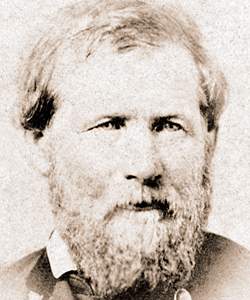John McAuley Palmer (American National Biography)
Scholarship
A Democrat since childhood, Palmer was elected probate justice of the peace in 1843. He was subsequently elected as a delegate to the state constitutional convention in 1847, county judge in 1848, and state senator in 1852. During his successful campaign for reelection to the senate in 1854, he exhibited an independence that would mark the remainder of his career. Rebuffing pressure from Democrats to support the Douglas policy on slavery in Kansas and Nebraska, Palmer ran instead as an Anti-Nebraska Democrat. This ended his friendship with Douglas and presaged an equally stormy sixteen-year Republican affiliation. In 1856 he presided at the new party's state convention, and at the Republican National Convention he attempted to secure the vice presidential nomination for Abraham Lincoln. Recognized as a leading Illinois Republican, he ran unsuccessfully for Congress in 1859 and helped Lincoln win nomination and election as president the next year.
Civil War military duty further revealed Palmer's qualities of leadership and combativeness. Enlisting as a colonel shortly after Fort Sumter, he served courageously in several battles and reached the rank of major general. However, he criticized the arrogance of some West Point officers, feuded with General William T. Sherman, and antagonized both civil and army officials as Lincoln's military commander in Kentucky. By war's end his ardent views on African-American enfranchisement and Reconstruction placed him in the Radical wing of his party.
Civil War military duty further revealed Palmer's qualities of leadership and combativeness. Enlisting as a colonel shortly after Fort Sumter, he served courageously in several battles and reached the rank of major general. However, he criticized the arrogance of some West Point officers, feuded with General William T. Sherman, and antagonized both civil and army officials as Lincoln's military commander in Kentucky. By war's end his ardent views on African-American enfranchisement and Reconstruction placed him in the Radical wing of his party.
Cullom Davis, "Palmer, John McAuley," American National Biography Online, February 2000, http://www.anb.org/articles/05/05-00584.html.
John McAuley Palmer (Congressional Biographical Directory)
Reference
PALMER, John McAuley, a Senator from Illinois; born at Eagle Creek, Scott County, Ky., September 13, 1817; moved with his family to Madison County, Ill., in 1831; attended the common schools of Kentucky and Illinois; in 1834 entered Alton (later Shurtleff) College, where he remained two years; taught school, peddled clocks, and studied law 1835-1838; admitted to the bar in 1839 and practiced in Carlinville, Ill., 1839-1861; probate judge of Macoupin County in 1843 and 1847; member of the State constitutional convention in 1847; county judge 1849-1852; member, State senate 1852-1854, 1856; unsuccessful Republican candidate for Congress in 1859; presidential elector on the Republican ticket in 1860; member of the peace convention of 1861 held in Washington, D.C., in an effort to devise means to prevent the impending war; during the Civil War was appointed colonel of the Fourteenth Regiment, Illinois Volunteer Infantry in 1861, and was mustered out as a major general in 1866; settled in Springfield, Ill., in 1867; Republican Governor of Illinois 1869-1873; unsuccessful Democratic candidate for Governor in 1888; elected as a Democrat to the United States Senate and served from March 4, 1891, to March 3, 1897; chairman, Committee on Pensions (Fifty-third Congress); was not a candidate for reelection in 1896; resumed the practice of law; unsuccessful candidate for president of the United States as a Gold Democrat in 1896; died in Springfield, Ill., September 25, 1900; interment in Carlinville City Cemetery, Carlinville, Ill.
"Palmer, John McAuley," Biographical Directory of the United States Congress, 1774 to Present, http://bioguide.congress.gov/scripts/biodisplay.pl?index=P000042.





